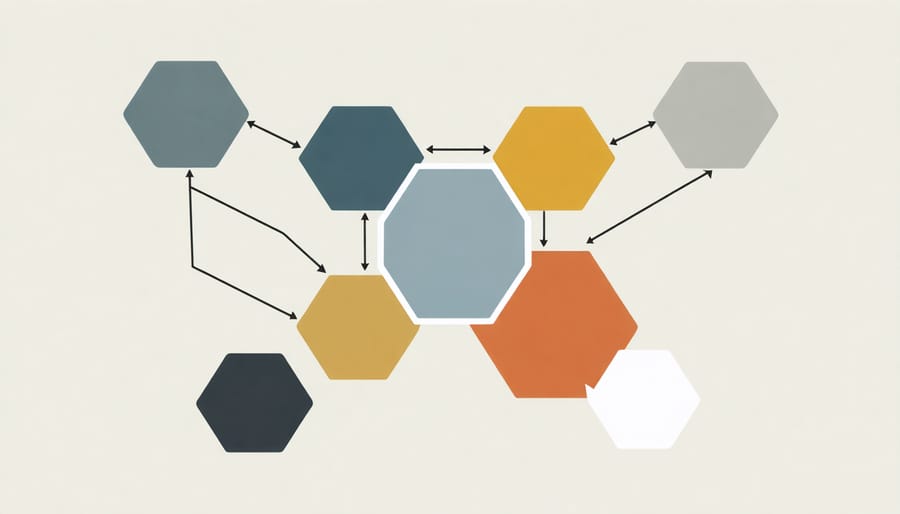
Imagine transforming your life’s scattered puzzle pieces into a beautifully cohesive masterpiece – that’s the essence of integrative life planning theory. Unlike traditional career planning that compartmentalizes our choices, this revolutionary approach weaves together every aspect of your life – career, relationships, personal growth, and well-being – into one harmonious tapestry.
In today’s fast-paced world, where the lines between work and life constantly blur, integrative life planning offers a refreshing perspective that acknowledges your whole self. It’s not just about climbing the career ladder; it’s about creating a life that resonates with your deepest values, nurtures your relationships, and honors your personal journey.
Think of it as your personal GPS for life’s journey, helping you navigate decisions big and small while keeping sight of the bigger picture. Whether you’re contemplating a career change, seeking better work-life balance, or simply yearning for more meaningful connections, this holistic approach provides the framework to align your choices with your authentic self.
Understanding Integrative Life Planning: A Holistic Approach

The Six Core Elements
Let’s explore the six core elements that form the foundation of integrative life planning – think of them as puzzle pieces that come together to create a more fulfilling life journey. As someone who’s personally navigated these elements, I can tell you they’re incredibly practical and relatable to our everyday experiences.
The first element focuses on finding meaning and purpose through work, encouraging us to align our careers with our personal values. The second element addresses the importance of connecting our lives holistically, weaving together work, family, and personal growth in a way that feels authentic to us.
Managing personal and professional transitions makes up the third element – something I’m sure many of us can relate to in today’s ever-changing world. The fourth element emphasizes exploring and honoring our cultural identities, recognizing how our backgrounds shape our choices and aspirations.
The fifth element tackles spirituality and life purpose, helping us understand what truly matters in our journey. Finally, the sixth element focuses on managing personal and environmental changes, teaching us to adapt while staying true to ourselves.
What I love about these elements is how they interweave, creating a framework that’s both structured and flexible. They remind us that life planning isn’t about rigid rules but rather about creating meaningful connections between different aspects of our lives.

How ILP Impacts Your Daily Life
Personal Growth and Development
Integrative Life Planning theory beautifully intertwines with our journey of self-discovery and growth. Through this approach, we learn to view personal development not as isolated achievements but as interconnected pieces of our life’s puzzle. I’ve found that incorporating mindful practices for personal growth helps us become more attuned to our authentic selves and the direction we want our lives to take.
When we embrace ILP’s holistic perspective, we naturally become more self-aware of how different aspects of our lives influence each other. This awareness helps us make more intentional choices about our careers, relationships, and personal aspirations. It’s like having a compass that guides us toward meaningful growth while considering all aspects of our wellbeing.
By incorporating wellness and self-care practices into our daily routines, we create space for reflection and growth. This might mean journaling about our values, meditating on our life’s purpose, or simply taking time to check in with ourselves about how our choices align with our broader life vision.
Career and Professional Goals
Gone are the days when career planning meant simply climbing the corporate ladder. Today, integrative life planning encourages us to weave our professional aspirations seamlessly with our personal values and life goals. I’ve seen countless women struggle with the traditional either-or mentality, feeling forced to choose between career success and personal fulfillment.
The beauty of integrative life planning lies in its holistic approach. Instead of viewing your career as a separate entity, you’re invited to consider how your work aligns with your core values, family life, and personal interests. For instance, if environmental sustainability matters deeply to you, you might seek roles that allow you to make an impact in this area while utilizing your professional skills.
Remember, your career goals don’t exist in isolation. They should complement your desired lifestyle, support your relationships, and contribute to your overall sense of purpose. This might mean choosing flexible work arrangements to accommodate family time, pursuing entrepreneurship to express your creativity, or selecting positions that allow you to contribute to causes you care about.
The key is to create synergy between your professional ambitions and personal aspirations, ensuring that your career choices enhance rather than detract from your life’s bigger picture.
Implementing ILP in Your Lifestyle
Creating Your Personal Framework
Creating your personal ILP framework doesn’t have to feel overwhelming. Think of it as building your dream house – you start with a solid foundation and add rooms that matter most to you. Let me share how I developed mine over a cup of coffee one Sunday morning, armed with just a notebook and colored pens.
Start by reflecting on six key life areas: career aspirations, personal relationships, health and wellness, spiritual growth, community involvement, and financial goals. Take time to envision where you’d like to be in each area, both short-term and long-term. Remember, there’s no one-size-fits-all approach here!
Next, identify connections between these areas. Maybe your career goals could align with your passion for community service, or your health objectives might support your spiritual journey. Draw these connections literally – I love creating mind maps that show how everything intertwines.
Finally, create action steps that honor these connections. For example, if you’re planning a career change, consider how it might impact your family life and financial goals. The beauty of ILP lies in its flexibility – your framework can evolve as you do, adapting to life’s natural changes and surprises.

Embracing Integrative Life Planning isn’t just about following a theory – it’s about embarking on a transformative journey toward a more fulfilling life. As we’ve explored, this holistic approach helps us weave together our career aspirations, personal values, and life experiences into a meaningful tapestry of purpose. Remember, there’s no one-size-fits-all solution, and that’s the beauty of ILP – it’s as unique as you are.
I’ve seen countless women transform their lives by taking that first step toward intentional planning. Whether you’re feeling stuck in your career, seeking better work-life harmony, or simply ready for a change, now is your perfect moment to begin. Start small – perhaps by journaling your values or mapping out your vision for the next year. Trust the process, embrace the journey, and know that every small step forward is progress toward your integrated, authentic life.



